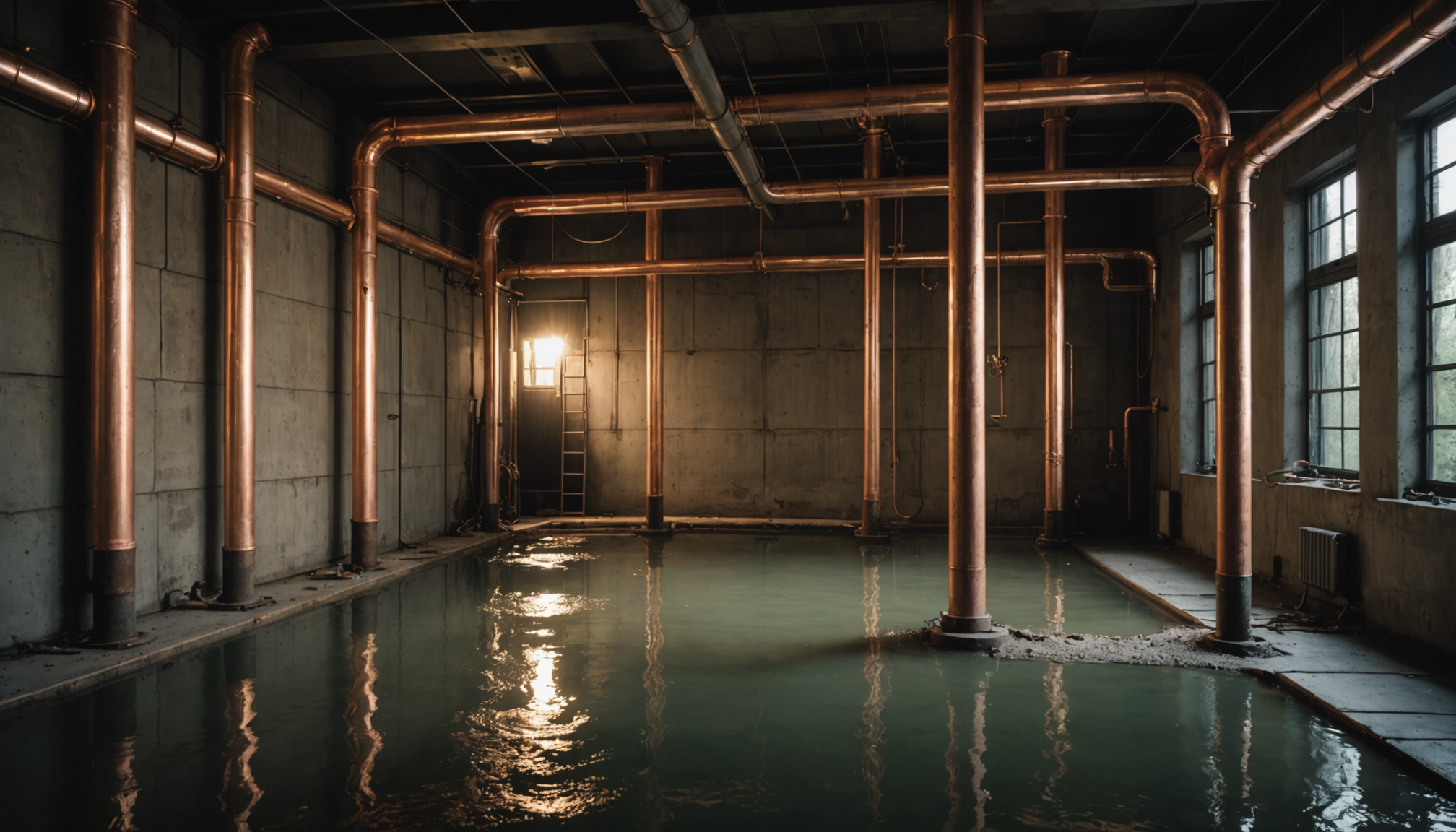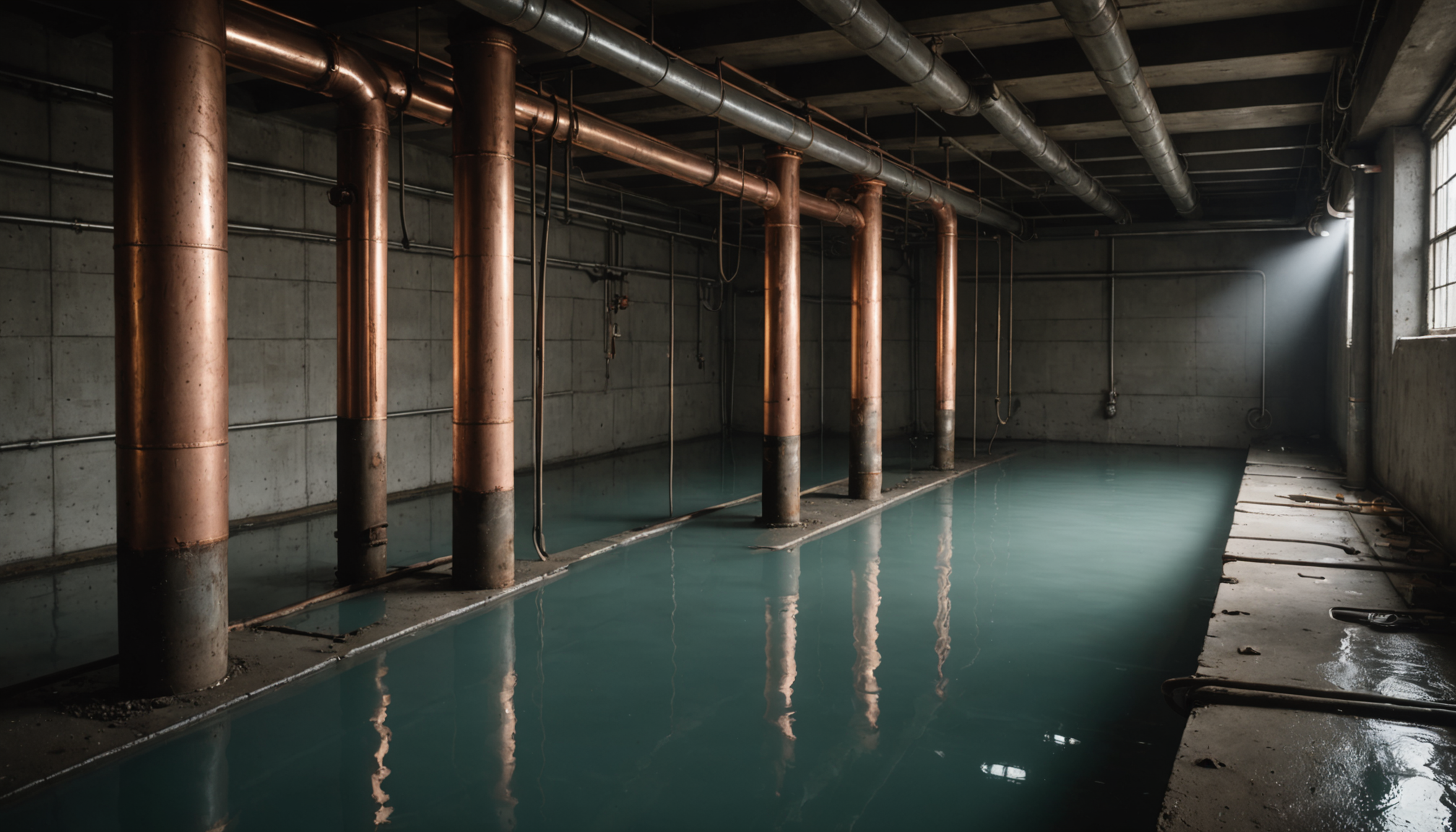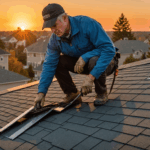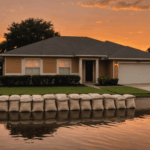In Orlando’s unique geological conditions, slab leaks occur when water pipes beneath your home’s concrete foundation develop breaks or cracks, leading to potentially devastating water damage. These plumbing failures affect approximately 20% of homes built on concrete foundations according to the American Society of Civil Engineers, with Florida’s homes being particularly vulnerable due to shifting soils and high water tables.
The anatomy of a slab leak typically involves either the hot or cold water lines that run through or under your home’s concrete foundation. According to the International Association of Certified Home Inspectors, copper pipes are most susceptible to these failures, with 85% of slab leaks occurring in copper plumbing systems that have been in place for 20 years or more.
Several factors contribute to slab leaks in Orlando homes:
- Soil chemistry and movement, particularly during Florida’s distinct wet and dry seasons
- Water pressure fluctuations that stress pipe joints
- Natural copper pipe deterioration due to Florida’s mineral-rich groundwater
- Construction defects or improper installation of plumbing systems
- External pressure from foundation settling or soil expansion
The Florida Building Code now requires specific protective measures for under-slab plumbing installations, but homes built before these regulations were implemented remain at higher risk. Data from local Orlando plumbing companies indicates that homes constructed between 1960 and 1990 experience the highest rates of slab leak incidents, with an average repair cost of $2,000 to $10,000 depending on severity and location.
Understanding the composition of your home’s plumbing system is crucial for prevention and early detection. Modern PEX piping systems have shown a 70% lower failure rate compared to traditional copper pipes, according to studies by the Plastics Pipe Institute. However, many Orlando homes still rely on older copper or galvanized steel plumbing systems that are more prone to developing slab leaks.
When water escapes from compromised pipes beneath the slab, it creates voids in the supporting soil structure, potentially leading to foundation issues. The Home Inspection Institute reports that untreated slab leaks can compromise up to 30% of a home’s structural integrity within just six months of continuous leakage.
Common symptoms of slab leaks
When a slab leak develops in your Orlando home, several telltale signs can alert you to the problem before it causes extensive water damage. One of the most common indicators is an unexplained spike in your water bill, with some homeowners reporting increases of 30% or more. If you notice warm spots on your floor, particularly when walking barefoot, this often signals a hot water line leak beneath the concrete slab.
The sound of running water when all fixtures are turned off is another crucial warning sign. Plumbing experts in Orlando note that even small slab leaks can produce audible water flow, especially during quiet nighttime hours. Moisture-related issues like mold growth, musty odors, or dampness around baseboards typically indicate water seeping up through the foundation.
Foundation-related symptoms may also become apparent as the leak progresses. Cracks in walls or floors, uneven flooring, or doors that suddenly stop closing properly can signal soil erosion beneath your home’s foundation due to persistent water leakage. In severe cases, homeowners might notice pooling water around the perimeter of their house or unexplained wet spots in their yard, even during dry weather.
The presence of mildew or excessive humidity in your home can also indicate a slab leak. Florida’s already humid climate makes homes particularly susceptible to these issues, and any additional moisture from plumbing leaks can quickly create ideal conditions for mold growth. Some homeowners report seeing their carpet or flooring becoming inexplicably damp or warped, especially in areas far from any visible water sources.
- A 20-30% increase in your water bill without changes in usage patterns is often the first sign of a slab leak
- Hot water line leaks typically create warm spots on flooring that can be detected by walking barefoot
- Foundation-related symptoms usually appear 3-6 months after a leak begins
- The sound of running water when all fixtures are off is 90% indicative of a plumbing leak
Detection methods for slab leak problems
Several DIY and professional detection methods exist for locating slab leaks in Orlando homes, but using them correctly is crucial. Advanced electronic leak detection equipment, operated by certified plumbers, can pinpoint leak locations with 98% accuracy through a combination of acoustic sensors and pressure testing.
One common mistake homeowners make is relying solely on visual inspection or attempting amateur detection methods, which often leads to inaccurate diagnoses and unnecessary concrete breakage. Professional plumbers use specialized equipment like:
• Acoustic listening devices that detect the sound of water escaping pipes
• Infrared cameras that identify temperature variations in flooring
• Pressure testing equipment to isolate and verify leak locations
• Electronic line locators to map pipe layouts beneath the slab
The most reliable detection process typically involves multiple steps. First, plumbers perform a preliminary pressure test to confirm the presence of a leak. Many homeowners skip this crucial step and jump to conclusions, potentially leading to unnecessary repairs. According to Orlando plumbing statistics, approximately 15% of suspected slab leaks turn out to be other issues when properly tested.
Electronic amplification equipment can detect water movement as small as 1/8 gallon per minute, making it possible to find even minor leaks before they cause significant water damage. However, it’s important to note that interference from household appliances can affect readings, which is why testing should be conducted with all water-using devices turned off.
Dye testing, while sometimes useful, shouldn’t be attempted without professional guidance. Many homeowners make the mistake of introducing dye into their plumbing system incorrectly, which can stain fixtures and provide false positives. Professional plumbers use specialized non-staining dyes and know exactly where to introduce them for accurate results.
Temperature differential scanning is particularly effective for hot water line leaks, but requires proper calibration and interpretation. DIY infrared cameras often lack the sensitivity needed for accurate readings, leading to misdiagnosis. Professional-grade thermal imaging equipment can detect temperature variations as small as 0.1 degrees Fahrenheit.
Professional repair options and costs
When facing a slab leak in Orlando, homeowners have several repair options available, each with distinct costs and benefits. Direct pipe repair typically ranges from $2,000 to $4,500, involving precise location identification and concrete removal to access the damaged section. This method works best for isolated leaks but requires breaking through the slab.
Pipe rerouting, also known as repiping, costs between $5,000 and $15,000 depending on home size. This approach bypasses the damaged pipe by installing new lines through walls or ceilings, eliminating the need for extensive concrete work. Many Orlando plumbing professionals recommend this option for homes with aging copper pipes, as it prevents future under-slab issues.
Epoxy pipe coating, a newer technology, ranges from $4,000 to $8,000. This non-invasive method involves coating the interior of existing pipes with epoxy resin, sealing leaks and preventing future corrosion. While effective for multiple small leaks, not all pipes are suitable candidates for this treatment.
The cost breakdown typically includes:
• Leak detection services: $300-$800
• Concrete removal and restoration: $500-$1,500
• Actual pipe repair or replacement: $1,200-$3,000
• Water damage restoration: $1,000-$5,000
Insurance coverage varies significantly. While some policies cover water damage repair, many exclude the actual plumbing repair costs. Orlando homeowners should verify their coverage before proceeding with repairs, as out-of-pocket expenses can be substantial.
Emergency repair services usually incur additional charges of 25-50% above standard rates. However, delaying repairs can lead to extensive water damage, potentially doubling or tripling the total cost. Local plumbing data shows that prompt repair typically saves homeowners an average of $3,500 in secondary damage costs.
Consider these factors when choosing a repair method:
• Age and condition of existing plumbing
• Location and severity of the leak
• Long-term cost-effectiveness
• Disruption to daily life
• Future sale potential of the home
Financing options are available through many Orlando plumbing companies, with some offering interest-free periods or payment plans. Some contractors also provide warranties ranging from 5 to 25 years, depending on the repair method chosen.
Remember that choosing the lowest bid isn’t always cost-effective. Qualified contractors with proper licensing and insurance may charge more but typically provide superior workmanship and warranties, reducing the likelihood of future problems.
Prevention and maintenance strategies
- How often should I inspect my home for potential slab leak signs?
- Professional plumbing inspections should be conducted annually for Orlando homes over 15 years old. Between inspections, monitor your water bills monthly and conduct visual checks of floors and walls every quarter for early warning signs.
- What’s the best way to protect my pipes from developing slab leaks?
- Maintain consistent water pressure between 40-60 PSI and install a water softener if you have hard water. Regular plumbing maintenance and prompt repair of small leaks can prevent larger issues from developing beneath your foundation.
- Can I prevent slab leaks by adjusting my water pressure?
- Installing a pressure regulator can help protect your plumbing system from excessive pressure fluctuations that contribute to slab leaks. Orlando plumbers recommend maintaining pressure below 80 PSI to reduce stress on pipes.
- Is it worth replacing all my copper pipes to prevent future slab leaks?
- Repiping with modern materials like PEX can be a worthwhile investment for homes over 20 years old or those with a history of leaks. While costly upfront, it can prevent expensive water damage and multiple repairs in the future.
- How does Florida’s climate affect my risk of slab leaks?
- Orlando’s high humidity, shifting soils, and seasonal weather patterns can accelerate pipe deterioration and increase slab leak risk. The combination of soil chemistry and temperature fluctuations makes regular maintenance particularly important in Florida homes.











